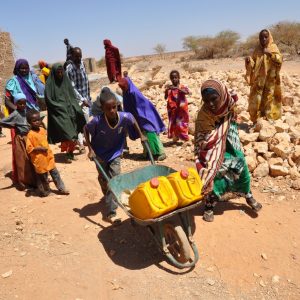The Stream, March 28: Colombia Community Votes Against Mining Amid Water Concerns
The Global Rundown
Residents of Colombia’s Tolima region voted to ban mining, in part due to concerns over groundwater. In Malaysia, the government decided to extend a ban on bauxite mining to address water pollution. As a famine looms in Somalia and three other countries in Africa and the Middle East, water scarcity is a serious threat to health. U.S.-backed forces in Syria deny that the Tabqa Dam sustained structural damage. Scientists found more evidence that extreme weather events, such as the California drought, are linked to climate change. A company plans to ship millions of liters of water each month from New Zealand to Asia. A proposed legal settlement would require the state of Michigan to replace thousands of lead water pipes in Flint by 2020.
“We underestimated the role of water and its contribution to mortality in the last famine. It gets overshadowed by the food.” –Ann Thomas, a water, sanitation and hygiene specialist for Unicef, referring to the 2011 famine in Somalia. Drought and conflict have once again conspired to push Somalia and three other countries to the edge of famine. The lack of food is compounded by scarce water supplies, spreading diseases like cholera. (The New York Times)
By The Numbers
18,000 Number of lead water pipes that could be replaced in Flint, Michigan by 2020 under a proposed settlement between the state and city residents. The work would cost the state $87 million. The New York Times
3 months Time Malaysia will extend a ban on bauxite mining that is meant to address water contamination from the mines. The ban is now set to end on June 30. Reuters
800 million liters Amount of water a private company plans to take each month from two New Zealand lakes to sell in China, India, and the Middle East, fanning a public outcry over bottled water practices. Guardian
In context: Learn more about proposed bulk water exports in Alaska.
Science, Studies, And Reports
Changes in major global wind patterns that can cause extreme weather like the California drought are much more likely to occur due to climate change, according to a study led by researchers at Pennsylvania State University. The study, which focused on wind patterns called “planetary waves”, provides new evidence linking climate change to extreme weather events. Guardian
On The Radar
In a referendum this week, an overwhelming majority of voters in Tolima, Colombia — 98.8 percent — expressed their desire to ban mining in the region. Concern about groundwater has fueled opposition to the La Colosa gold mine, though the project’s owner, AngloGold, insists it will not affect water supplies. Reuters
In context: Water supplies are often at the center of conflicts over resource extraction, posing a significant risk for the global mining industry.
U.S.-backed forces fighting in Syria dismissed concerns about the integrity of the Tabqa Dam on Monday, saying there was no structural damage. A Syrian government official recently warned that airstrikes during the fight for Raqqa put the dam at risk. Reuters
A news correspondent for Circle of Blue based out of Hawaii. She writes The Stream, Circle of Blue’s daily digest of international water news trends. Her interests include food security, ecology and the Great Lakes.
Contact Codi Kozacek




